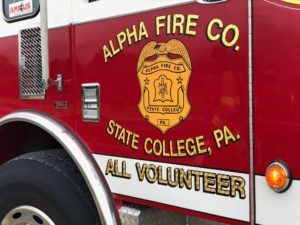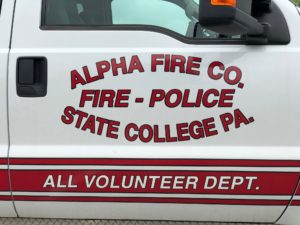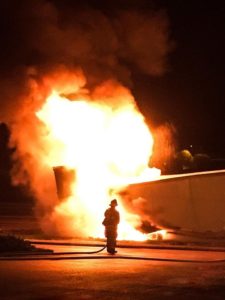Do You Have Time To Be A Volunteer Firefighter?
March 20, 2019
Alpha Answers Some Frequently Asked Questions.
Family first. Job second. Fire company third. Far more often than you might realize, this is how the actual time commitment to volunteer firefighting nets out. And while it is true that the most intensive part of that commitment is your initial training itself, you’ll be pleased to know that the company works hard to accommodate everyday life.
Training to become an Alpha is a serious commitment of time and energy—there’s a lot to learn in that first 18 months and you will need to be able to accommodate the training schedule—but remember, the certifications you are earning become part of your lifetime skill set and experience.
See what we ask of every Alpha trainee here.


Many volunteers will tell you, once it gets under your skin, it becomes a part of you that fills you with pride and purpose and a sense of constant accomplishment not easily replicated by other endeavors.
Commonly Asked Time Management Questions About Being A Member Of A Volunteer Fire Department.
Are you on call 24-7?
Not if you don’t care to be. With very few exceptions (extreme emergency response events), you are offered an on-call schedule that you help to define based on the life you lead, the job you have and the commitments you regularly keep in daily life.
That being said? We as a company are actually on-call at all times. We never know when we might have to get up and leave something. We never know when we might have to get up and sacrifice what we’re doing to get a rig on a street.
Will I ever have to leave my job or be late for work?
Almost always, no. There are rare occasions that demand a larger turnout of personnel, an emergency that just cannot be denied. But you’ll be pleased to know how flexible most employers are,** knowing that you might be the person rushing off to save or protect something important to them or someone they care about.
** Important note: Employers are not obligated to release you from work but they are, by law, not permitted to dismiss you for being late as a result of your fire company participation.
Do I have to work nights and weekends?
Sometimes. What’s great about a vibrant volunteer organization is how we learn to organize and schedule members “around the clock” to minimize the strain of scheduling. Couple that, with the fact that at Alpha we have a live-in contingent of personnel, more often than not your time here (or to be available) is a time that will work for you.
We all pitch in—we all take shifts sometimes that do stretch us out a little bit, but those are the exceptions rather than the rules.
Isn’t fighting fires time consuming?
This is a great question we get—because the answer is yes, no and then no again. While a deployment to an actual fire event can take several hours of work… the actual fighting of the fire tends to be relatively short by comparison, with firefighters rotating into the fray every 15 minutes or so.
The staging of the fireground and plan of attack coupled with the extensive demands of managing the hot zone, cleanup of the fireground and our extensive equipment maintenance after the fire take a lot more time.
Where “no again” comes in is the real surprise, because comparatively speaking, few of our calls are actually active fires. Smoke alarms going off, CO2 sensors being activated, fender benders, major event supervision or management, suspicious smoke, downed power lines, entrapments (such as in elevators or over embankments), and a host of other potential calls make up the bulk of our active calls, week-to-week.
What Alphas Have To Say About Time And Training
Here are some of the things actual Alpha Volunteer firefighters had to say about time management and training as a volunteer firefighter:
 Janet Welsh, PSU Professor, Fire Police
There are membership requirements and expectations for how many times you sign up for a shift or come out for a call, but they’re really very modest. The average person could manage them, even if you have a family and work full time.
Janet Welsh, PSU Professor, Fire Police
There are membership requirements and expectations for how many times you sign up for a shift or come out for a call, but they’re really very modest. The average person could manage them, even if you have a family and work full time.
 Rob Nese, Equipment Technician, Lieutenant
Within your first year and a half, we will give you all the tools you need to become the firefighter we’re counting on. If you’re interested in doing it and want to join, believe me, you’ll make the time for it. If you’re NOT having fun at the firehouse, then it’s not for you.
Rob Nese, Equipment Technician, Lieutenant
Within your first year and a half, we will give you all the tools you need to become the firefighter we’re counting on. If you’re interested in doing it and want to join, believe me, you’ll make the time for it. If you’re NOT having fun at the firehouse, then it’s not for you.
 Christophe Cheroret, Doctoral Candidate, Firefighter
Alpha is really good at fostering training and support outside the company. Stop by. Maybe this is for you, maybe this isn’t. You have to dive in. Meet the people that are here. Stop by and see if this fits for you.
Christophe Cheroret, Doctoral Candidate, Firefighter
Alpha is really good at fostering training and support outside the company. Stop by. Maybe this is for you, maybe this isn’t. You have to dive in. Meet the people that are here. Stop by and see if this fits for you.
 Mike Faustina, Fire Inspector, Firefighter, Driver/Operator
There is a lot of training as a firefighter, no question about it. But you have 18 months to get all your initial training–a lot of certifications. The training at Alpha is true to life; it’s a live experience and more directed to what you’re going do in the fire department.
Mike Faustina, Fire Inspector, Firefighter, Driver/Operator
There is a lot of training as a firefighter, no question about it. But you have 18 months to get all your initial training–a lot of certifications. The training at Alpha is true to life; it’s a live experience and more directed to what you’re going do in the fire department.
 Alexa Tiemann, PSU Student, Firefighter
I’m a full time student at Penn State, an information technology and science major. I work two other jobs—I’m an EMT on campus and also an EMT at another fire department in Pleasant Gap. Yes. I still sleep! It can be rigorous, but there’s a huge teaching environment here that’s really nice.
Alexa Tiemann, PSU Student, Firefighter
I’m a full time student at Penn State, an information technology and science major. I work two other jobs—I’m an EMT on campus and also an EMT at another fire department in Pleasant Gap. Yes. I still sleep! It can be rigorous, but there’s a huge teaching environment here that’s really nice.
If You’ve Read This Far, Then Take One Step Farther.
The best way to know if the challenges and rewards of becoming an Alpha Volunteer meet your interest, desire and lifestyle is to stop by the station. Take a tour. Talk to our members. We’re firefighters and fire police, certainly … but no one here will blow smoke—we’ll tell you like it is and show you how it works.
That’s how all of us got started.
Learn more, here.

 Many volunteers will tell you, once it gets under your skin, it becomes a part of you that fills you with pride and purpose and a sense of constant accomplishment not easily replicated by other endeavors.
Many volunteers will tell you, once it gets under your skin, it becomes a part of you that fills you with pride and purpose and a sense of constant accomplishment not easily replicated by other endeavors.
 Sometimes. What’s great about a vibrant volunteer organization is how we learn to organize and schedule members “around the clock” to minimize the strain of scheduling. Couple that, with the fact that at Alpha we have a live-in contingent of personnel, more often than not your time here (or to be available) is a time that will work for you.
We all pitch in—we all take shifts sometimes that do stretch us out a little bit, but those are the exceptions rather than the rules.
Isn’t fighting fires time consuming?
This is a great question we get—because the answer is yes, no and then no again. While a deployment to an actual fire event can take several hours of work… the actual fighting of the fire tends to be relatively short by comparison, with firefighters rotating into the fray every 15 minutes or so.
The staging of the fireground and plan of attack coupled with the extensive demands of managing the hot zone, cleanup of the fireground and our extensive equipment maintenance after the fire take a lot more time.
Where “no again” comes in is the real surprise, because comparatively speaking, few of our calls are actually active fires. Smoke alarms going off, CO2 sensors being activated, fender benders, major event supervision or management, suspicious smoke, downed power lines, entrapments (such as in elevators or over embankments), and a host of other potential calls make up the bulk of our active calls, week-to-week.
Sometimes. What’s great about a vibrant volunteer organization is how we learn to organize and schedule members “around the clock” to minimize the strain of scheduling. Couple that, with the fact that at Alpha we have a live-in contingent of personnel, more often than not your time here (or to be available) is a time that will work for you.
We all pitch in—we all take shifts sometimes that do stretch us out a little bit, but those are the exceptions rather than the rules.
Isn’t fighting fires time consuming?
This is a great question we get—because the answer is yes, no and then no again. While a deployment to an actual fire event can take several hours of work… the actual fighting of the fire tends to be relatively short by comparison, with firefighters rotating into the fray every 15 minutes or so.
The staging of the fireground and plan of attack coupled with the extensive demands of managing the hot zone, cleanup of the fireground and our extensive equipment maintenance after the fire take a lot more time.
Where “no again” comes in is the real surprise, because comparatively speaking, few of our calls are actually active fires. Smoke alarms going off, CO2 sensors being activated, fender benders, major event supervision or management, suspicious smoke, downed power lines, entrapments (such as in elevators or over embankments), and a host of other potential calls make up the bulk of our active calls, week-to-week.
 Janet Welsh, PSU Professor, Fire Police
There are membership requirements and expectations for how many times you sign up for a shift or come out for a call, but they’re really very modest. The average person could manage them, even if you have a family and work full time.
Janet Welsh, PSU Professor, Fire Police
There are membership requirements and expectations for how many times you sign up for a shift or come out for a call, but they’re really very modest. The average person could manage them, even if you have a family and work full time.
 Rob Nese, Equipment Technician, Lieutenant
Within your first year and a half, we will give you all the tools you need to become the firefighter we’re counting on. If you’re interested in doing it and want to join, believe me, you’ll make the time for it. If you’re NOT having fun at the firehouse, then it’s not for you.
Rob Nese, Equipment Technician, Lieutenant
Within your first year and a half, we will give you all the tools you need to become the firefighter we’re counting on. If you’re interested in doing it and want to join, believe me, you’ll make the time for it. If you’re NOT having fun at the firehouse, then it’s not for you.
 Christophe Cheroret, Doctoral Candidate, Firefighter
Alpha is really good at fostering training and support outside the company. Stop by. Maybe this is for you, maybe this isn’t. You have to dive in. Meet the people that are here. Stop by and see if this fits for you.
Christophe Cheroret, Doctoral Candidate, Firefighter
Alpha is really good at fostering training and support outside the company. Stop by. Maybe this is for you, maybe this isn’t. You have to dive in. Meet the people that are here. Stop by and see if this fits for you.
 Mike Faustina, Fire Inspector, Firefighter, Driver/Operator
There is a lot of training as a firefighter, no question about it. But you have 18 months to get all your initial training–a lot of certifications. The training at Alpha is true to life; it’s a live experience and more directed to what you’re going do in the fire department.
Mike Faustina, Fire Inspector, Firefighter, Driver/Operator
There is a lot of training as a firefighter, no question about it. But you have 18 months to get all your initial training–a lot of certifications. The training at Alpha is true to life; it’s a live experience and more directed to what you’re going do in the fire department.
 Alexa Tiemann, PSU Student, Firefighter
I’m a full time student at Penn State, an information technology and science major. I work two other jobs—I’m an EMT on campus and also an EMT at another fire department in Pleasant Gap. Yes. I still sleep! It can be rigorous, but there’s a huge teaching environment here that’s really nice.
Alexa Tiemann, PSU Student, Firefighter
I’m a full time student at Penn State, an information technology and science major. I work two other jobs—I’m an EMT on campus and also an EMT at another fire department in Pleasant Gap. Yes. I still sleep! It can be rigorous, but there’s a huge teaching environment here that’s really nice.